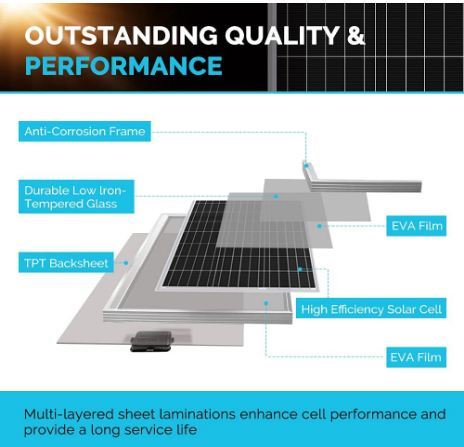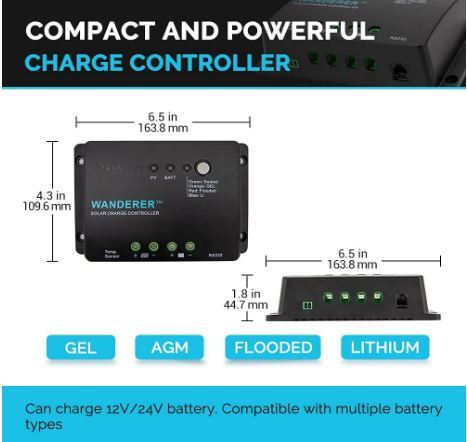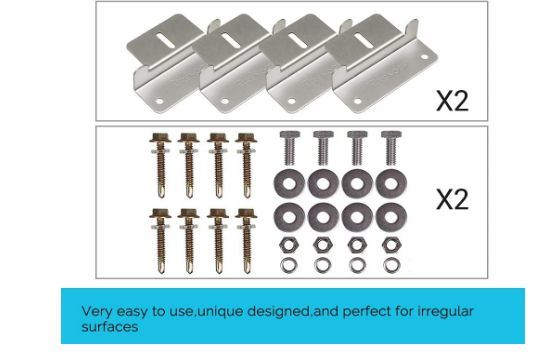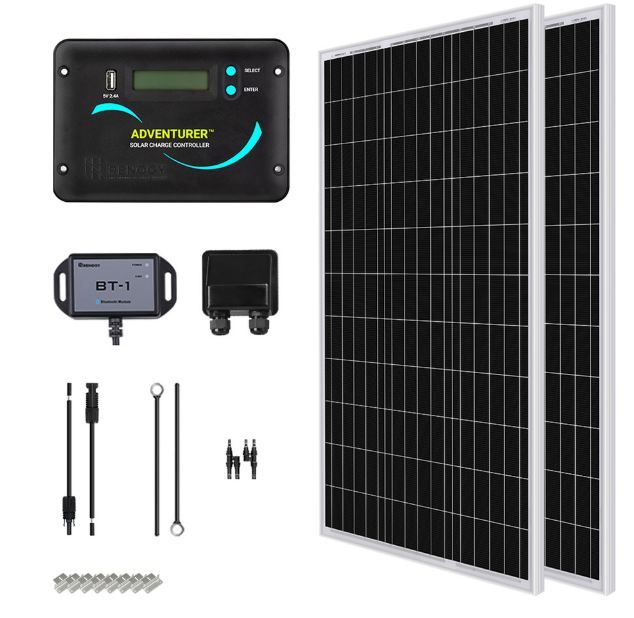Looking for a mid-range solar power kit for your RV so you can avoid relying on noisy gas-powered generators while parked?
The lightweight, reliable and efficient Renogy 200W solar panel kit comes loaded with advanced features, installation hardware, and an integrated solar panel charging system that will keep two 200ah x 12V batteries topped up each day, assuming from 50% discharge.
The two included 100W monocrystalline solar panels are framed in weather safe aluminum with mounting holes are pre-drilled in it, so they are easy to install.
Pros and Cons
Pros
Cons
Best Features

Here are some of the best features that you should look up to while buying this solar panel kit.
Designed specifically for RVs
There is a plethora of 200W solar panel kits on the market, but not all of them are tailored for RVs like this one.
For one, the 30a power output is important for RV power systems. Many 200W kits only provide 20a of power.
The Renogy 200W solar panel kit is also designed specifically for setting up on your RV's roof. The solar panels have gridless cells and a corrosion-resistant aluminum frame, protecting them well.
The wind resistance of 2400Pa and snow tolerance of 5400Pa makeensure that the solar panels can tolerate harsh weather conditions without requiring any repairs or replacement.
200W of Solar Power
With consistent sunlight exposure of 5 hours, the two 100W panels can provide up to 1,000Wh of recharge capacity daily.
This is enough to keep a bank of 2 x 200Ah x 12V batteries topped up from 50% discharge while providing a few hundred Wh of energy per day to keep your electronics charged, run a fan, and keep LED lights on indefinitely.
Unfortunately, this is not enough to run your AC, oven, or heater for any useful period of time.
Solar Panels
Its solar panels are durable and highly efficient, making it an excellent solar panel kit. The panels have tempered glass, which can withstand impact with birds and other objects.
These panels also have an anti-reflective coating on them. Thus, they absorb the maximum amount of sunlight without reflecting any of it back.
The monocrystalline panels have high-efficiency cells, so there is minimum possible wastage of energy. Renogy solar panels have a negative and a positive layer.
These layers create an electric field, which feeds current to a charge controller. The charge controller controls the amount of current that is stored in the battery.
This prevents the current overflow, making sure the appliances do not get damaged.
Combiner Cord
This Renogy kit also includes a combiner cord to join your panels in serial.
Charge Controller

This solar panel kit has a 30A PWM charge controller as well. It delivers a nominal voltage of 12 VDC and a rated charge current of 30A.
The charge controller is relatively lightweight at only 0.65 pounds and can be installed anywhere in your RV. It prevents the overflow or underflow of charge effectively.
Its self-consumption is less than 10 mA, so it does not cause any wastage of current.
Wiring
The kit includes a pair of 20 feet long solar cables with a value of 10 AWG. It includes a pair of tray cables as well, which are 8 feet long.
Installation Hardware
We also recommend the Renogy 200 watt solar panel kit because of its fuss-free mounting hardware. It includes 2 z-brackets for mounting along with a pair of Y branch connectors.
So, you will not have to invest in an extra mounting kit to install the solar panels.
Issues and Concerns
The Renogy solar panel kit is a proven workhorse for most medium RV setups. But there are some issues that you need to consider before buying it.
Expensive
One issue that you will notice right away is that this solar panel kit is slightly on the expensive side. There are plenty of other 200W options on the market now. But this is the most proven.
Inverter Not Included
The kit does not come with an inverter, but this is normal for most RV solar kits. Most owners need to size one for their unique setup.
How Does the Renogy 200W RV Solar Kit Differ From The Competition?
Renogy is a company based in the USA and has its headquarters here. Most of their employees are in the USA as well.
That said, some of the manufacturing is completed in a few cities of China.
The Renogy 200 watt solar panel kit is an excellent choice for RV owners.
Capacity and feature-wise, it compares with many other RV solar panel kits like the 200W 30A by ACOPOWER.
This Renogy solar panel kit comes with an older-tech 30A PWM charge controller, while the ACOPOWER kit has a 30A MPPT charge controller better suited for Li and LiFePO4 batteries found in most solar generators and portable power stations. An MPPT charge controller also wastes less than a PWM controller.
On the plus side, installing the Renogy solar panel kit is more manageable than installing the ACOPOWER solar panel kit. Both of these kits come with two z-mounting brackets.
But, the Renogy solar panels also have Y branch connectors and pre-drilled mounting holes.
Solar cables that come with the Renogy kit are also 10 AWG, while ACOPOWER cables are 12 AWG, which makes the solar cables in Renogy a bit more efficient.
Installation

Proper installation of the Renogy 200 watt solar panel kit is the first step to power your appliances in the RV.
Here is a brief description of what you'll need to do:
- Figure out where you have to mount the solar kit on the RV. The front of an RV's roof is an ideal spot for solar panel kits as it gets the most sunlight.
- After you have selected a spot for installing the solar panels, fix them in place using the pre-drilled mounting holes.
- Next, you have to run the wires through the connections. Some of the wires might remain uncovered, but it is better to tuck them below the solar panel.
- Now, hook up the charge controller at a safe spot in your RV. Some people prefer to hook it on the wall in the front storage compartment as it is easily accessible.
- Check all the connections at the end and make sure everything is in the right place before connecting it with a battery.
Care and Maintenance
Taking care of the Renogy 200 watt solar panels is relatively easy, but you have to clean them frequently as dust and grime will reduce their output considerably.
You should begin by blowing off stuck leaves via a leaf blower. Then, spray some water on it using a garden hose, and it will be free of all the debris and accumulated dirt.
In case of snowfall, you should clean the panels using lukewarm water. Do not use hot water to clear the snow as it will make the tempered glass in panels crack.
Warranty
Renogy 200W RV solar kit comes with a workmanship and materials warranty of 5 years. This is considerably longer than most Chinese alternatives.
The solar panels come with a 25 year warranty, which is becoming the norm these days. The company offers a 5-year / 95% efficiency rate warranty as well.
Specifications | |
|---|---|
Solar Panel: | Monocrystalline |
Dimensions: | 47.3 x 21.3 x 1.4 inches |
Weight: | 16.34 pounds |
Max. Power Delivery: | 200 Watt |
Max. Power Voltage: | 17.7V |
Max. Power Current: | 10.35A |
Controller Model: | Adventurer 30A PWM |
Mounting: | MTS-ZB |
Wind Resistance: | Withstands high winds of up to 2400Pa |
Snow Tolerance: | 5400Pa |
Battery Support: | lead-acid, lithium, and gel batteries |
Where to Buy
You can learn more about the Renogy 200W RV Solar Kit by visiting the official product page. The kit is available for sale on Amazon, in better RV stores, and on the Renogy's site.


